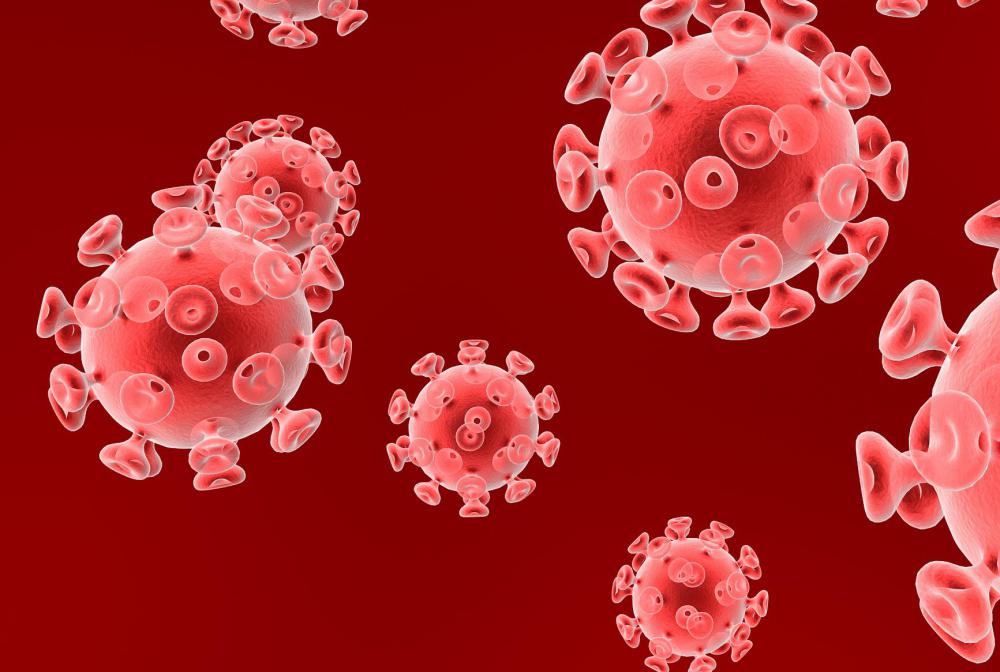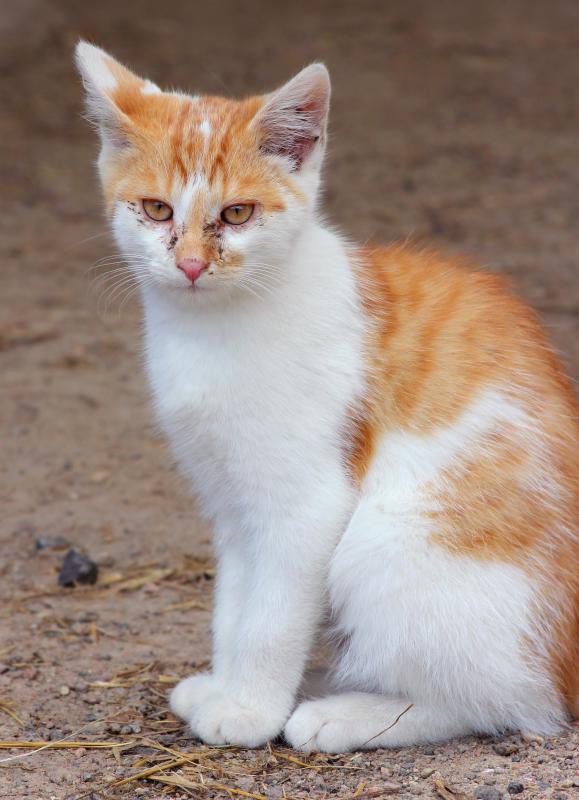At AllThingsNature, we're committed to delivering accurate, trustworthy information. Our expert-authored content is rigorously fact-checked and sourced from credible authorities. Discover how we uphold the highest standards in providing you with reliable knowledge.
What is FeLV?
FeLV is an acronym for Feline Leukemia Virus, a terminal illness affecting all members of the cat family including domestic house pets. Unlike leukemia that affects humans, FeLV is a contagious virus that is spread through cat to cat contact.
This condition affects the cat’s immune system by causing an increase of leukocytes, a type of cell found in the blood stream, lymph nodes and other blood forming tissues of the body which are critical in fighting infections. Because it is a disease of the immune system, the symptoms may be different for each individual cat.

The most common symptoms of this condition include enlarged nymph nodes making eating and drinking very difficult, anemia, tumors, lethargy, abscesses, weight loss, coughing and sneezing. FeLV is a terminal illness and the cause of death can be anything from pneumonia to cancer as a result of the cat’s inability to fight infection.
FeLV is spread from cat to cat through the transfer of body fluids, mainly saliva or urine and feces as a result of sharing litter boxes. Domestic cats that are allowed outdoors are more likely to contract this condition because they are more likely to come in contact with infected cats. Cats that live in areas with large populations of feral or stray cats are more prone to becoming infected. It quickly travels through feral cat colonies due to competition and territorial fighting over food and mating.

The rate at which symptoms appear after a cat is infected also varies among individual cats. Some cats will get very sick almost immediately upon contracting the virus. In other cats the virus can lay dormant for years. Sometimes an infected cat will never fall ill and be able to live an average lifespan. However, whether or not the cat ever shows symptoms it is still able to spread the virus to other cats.

This condition is usually diagnosed by blood tests performed by veterinarians. This is currently the only way to diagnose the disease and still it is not 100% reliable. Blood tests often show false negative and weak positive results. However a blood test that shows a strong presence of this condition is rarely wrong.
Currently there is no cure for FeLV. In early stages of the disease the cat’s symptoms can be treated helping to prolong the cat’s life. It is possible that an early diagnosis can allow the cat to live a normal life with consistent treatment. Fortunately, there is a vaccine for this condition.

The vaccine is given to kittens as early as six weeks and adults upon testing negative for the virus. After the first dose of the vaccine, a booster shot is given 3 weeks later. After the initial immunizations, the vaccine needs to be updated annually to ensure effectiveness. Having your cat vaccinated is a good idea if your pet is going to be allowed outdoors. The vaccine is extremely important if you have more than one cat and one of them is found to be infected with FeLV.

Researchers are working diligently to find a cure as well as to eradicate feline leukemia virus not only for domestic cat lovers but for the wild members of the cat family also. FeLV can be transmitted from domestic to wild cats and vice versa, making it extremely hazardous for endangered cat populations. As such even though cats can possibly outlive their disease, animal shelters routinely test every cat in their possession and euthanize those that are infected. Stray cat colonies are also sampled and those where FeLV is endemic are captured and destroyed to prevent further transmission of the disease.
Frequently Asked Questions
What is FeLV and how does it affect cats?
FeLV, or Feline Leukemia Virus, is a retrovirus that infects cats, leading to a variety of health issues, including anemia, lymphoma, and immune deficiency, which makes them susceptible to other infections. According to the Cornell Feline Health Center, FeLV is one of the most common infectious diseases in cats and can reduce a cat's lifespan.
How is FeLV transmitted among cats?
FeLV is primarily spread through close contact with infected cats. Saliva is the most common means of transmission, often through grooming, sharing food or water dishes, and bites. It can also be passed from mother to kittens, either in utero or through milk. Less commonly, it can spread through urine and feces.
Can FeLV be transmitted to humans or other animals?
No, FeLV is species-specific and cannot be transmitted to humans or other animals. It only affects cats. This means that while it is a serious concern for feline health, it poses no risk to other pets in the household or to the people caring for an infected cat.
What are the symptoms of FeLV in cats?
Symptoms of FeLV can vary widely but may include lethargy, weight loss, poor coat condition, fever, diarrhea, and respiratory infections. As the virus progresses, it can lead to more severe conditions such as anemia, lymphoma, and other cancers. Early stages of the infection may not show any symptoms, making regular veterinary screenings crucial.
Is there a vaccine for FeLV?
Yes, there is a vaccine for FeLV that is considered effective in preventing the disease in many, but not all, cats. The American Association of Feline Practitioners recommends the FeLV vaccine for all kittens and for adult cats at risk of exposure. However, vaccination decisions should be made based on each cat's lifestyle and risk factors.
Can FeLV-positive cats live with other cats?
FeLV-positive cats can live with other cats, but it requires careful management to prevent the spread of the virus. It's recommended to keep FeLV-positive cats indoors and separate from FeLV-negative cats to minimize the risk of transmission. Regular veterinary care and monitoring are essential to manage the health of all cats in the household.
AS FEATURED ON:
AS FEATURED ON:















Discussion Comments
I agree that it seems harsh to euthanize cats who have this virus. Like anon230074 said, "Why don't they kill all HIV positive people too, then?". All in all this is just sad. Hopefully the cure is around the corner.
I totally disagree with the idea of killing a cat just because it tests positive for FELV. Why don't they kill all HIV positive people too, then? If that is unthinkable, then so is killing a FIV+ or FeLV+ cat!
I agree. I had a cat that lived 13 years testing positive for FeLV since one year old! I'd be interested to know how many such cases there are - if someone knows of other long survivors, please let us know!
I am strongly against the idea of stamping out infected colonies - so many vets recommend to put down cats simply because they test FeLV+. That's crazy.
This was somewhat misleading. FELV is actually a virus, not a terminal illness. Some cats can live quite long lives while carrying FELV. A critical time seems to occur between the second and third years of life, and some cats die around that time. But many live longer without symptoms. So referring to it as "terminal" is not really accurate. Cats can carry FELV and live long lives, though they have compromised immune systems.
Post your comments